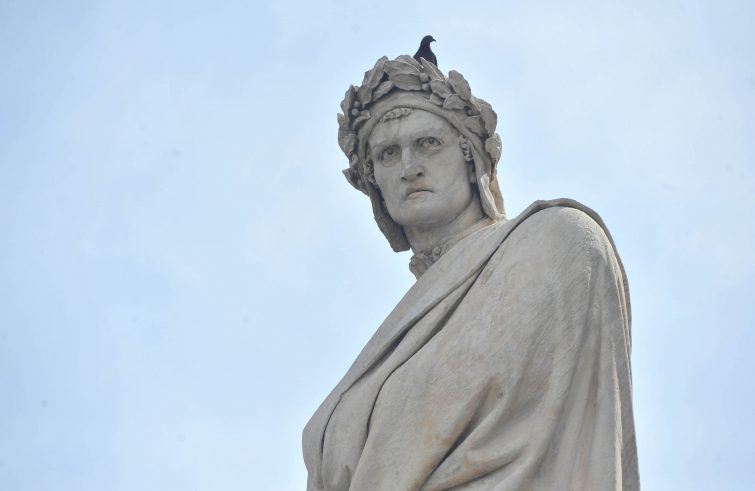
Dante Alighieri, “a prophet of hope and a witness to the innate yearning for the infinite present in the human heart” writes Pope Francis in the Apostolic Letter Candor lucis aeternae, marking the seventh centenary of the death of the supreme poet. The Divine Comedy must be read as “an epic journey, indeed, a true pilgrimage, personal and interior, yet also communal, ecclesial, social and historical, the paradigm for every authentic journey” towards happiness, writes Francis, for whom Dante is
“a prophet of hope, a herald of the possibility of redemption, liberation and profound change for each individual and for humanity as a whole.”
His work continues to enrich the minds and hearts of all those, especially the young who once introduced to his poetry sense “a remarkable resonance with their own experience”, despite the great distance in time.
“Dante’s work is an integral part of our culture”, writes the Pope,
“taking us back to the Christian roots of Europe and the West. It embodies that patrimony of ideals and values that the Church and civil society continue to propose as the basis of a humane social order in which all can and must see others as brothers and sisters.” Dante, perpetual exile, “pondering his life of exile, radical uncertainty, fragility, and constant moving from place to place, sublimated and transformed his personal experience, making it a paradigm of the human condition, viewed as a journey – spiritual and physical – that continues until it reaches its goal.” Therefrom derive two fundamental themes of Dante’s entire work: “every existential journey begins with an innate desire in the human heart and that this desire attains fulfilment in the happiness bestowed by the vision of the Love who is God.”
Dante’s prophetic mission, notes the Pope, “thus entailed denouncing and criticizing those believers – whether Popes or the ordinary faithful – who betray Christ and turn the Church into a means for advancing their own interests
while ignoring the spirit of the Beatitudes and the duty of charity towards the defenceless and poor, and instead idolizing power and riches.” “Yet even as he denounces corruption in parts of the Church, Dante becomes – through the words of Saint Peter Damian, Saint Benedict and Saint Peter – an advocate for her profound renewal and implores God’s providence to bring this about.”
“Dante reads the depths of the human heart. In everyone, even in the most abject and disturbing figures, he can discern a spark of the desire to attain some measure of happiness and fulfilment.”
Thus the Pope describes another facet of Dante’s genius: the ability to stop and listen to the souls he meets, thereby becoming the interpreter of their torments or their bliss: “Dante’s journey was truly a journey of desire, of a deep interior resolve to change his life, to discover happiness and to show the way to others who, like him, find themselves in a ‘forest dark’ after losing ‘the right way’.” “The journey that Dante presents is not illusory or utopian; it is realistic and within the reach of everyone, for God’s mercy always offers the possibility of change, conversion, new self-awareness and discovery of the path to true happiness”, Francis remarks, noting that
several episodes in the Comedy “are not only signs of God’s infinite mercy, but also confirm that human beings remain ever free to choose which path to follow and which destiny to embrace.”
Thus “Dante champions the dignity and freedom of each human being as the basis for decisions in life and for faith itself. Our eternal destiny – so Dante suggests by recounting the stories of so many individuals great and small – depends on our free decisions. Even our ordinary and apparently insignificant actions have a meaning that transcends time: they possess an eternal dimension. The greatest of God’s gifts is the freedom that enables us to reach our ultimate goal as Beatrice tells us.” But freedom, Dante reminds us, “is not an end unto itself; it is a condition for rising constantly higher. His journey through the three kingdoms vividly illustrates this ascent, which ultimately reaches heaven and the experience of utter bliss.”
“A forerunner of our multimedia culture, in which word and image, symbol and sound, poetry and dance converge to convey a single message”,
is Dante’s portrait depicted in the closing lines of the Apostolic Letter. For Francis, “Dante today does not wish merely to be read, commented on, studied and analyzed. His humanism remains timely and relevant, a sure reference point for what we hope to accomplish in our own day.” Hence Dante’s work should be “better known and appreciated, accessible and attractive”, not only to students and within academic institutions but also throughout Christian communities and among artists.
“At this particular moment in history, overclouded by situations of profound inhumanity and a lack of confidence and prospects for the future, the figure of Dante, prophet of hope and witness to the human desire for happiness, can still provide us with words and examples that encourage us on our journey”,
concludes the Pope: “Dante can help us to advance with serenity and courage on the pilgrimage of life and faith that each of us is called to make, until our hearts find true peace and true joy, until we arrive at the ultimate goal of all humanity: ‘The Love which moves the sun and the other stars’.”











